|
|
Posted 7/3/2008 (link)
 We're proud to announce the creation of a new Walter Lowenfels author page, collecting a number of readings and lectures by this iconoclastic poet, journalist and editor. PennSound co-director Al Filreis speaks to Lowenfels' significance in a recent blog post — calling him "the Zelig of modern American poetry," Filreis notes that Lowenfels was "part of nearly every aesthetic and political movement of his time. In the 20s he was an expatriate avant-gardist living, writing, experimenting, publishing, frolicking in Paris; toward and in the 1930s he became a political activist, and a member of the Communist Party; in the 1950s he actually went to jail after having been convicted under the anticommunist Smith Act, and wrote sonnets to love and liberty while in jail; re-emerging in the early and mid-1960s, he was taken up avidly by a new generation of readers and became a leader among the poet-activists who opposed the war in Vietnam."
PennSound's collection of recordings reflects the breadth of Lowenfels' life-long experience, including a generous selection from Sonnets of Love and Liberty and Other Poems, as well as the pacifist verse included in Poetry Against War and Other Poems, from readings given at The Library of Congress, Temple University and numerous other locations. We're also glad to be able to include a number of recorded lectures — addressing topics as varied as Modernism, Walt Whitman and Paris in the 20s and 30s, along with his own life and career.
We're grateful for the assistance of Lowenfels' daughter, Judy Dew, who graciously provided us with these recordings, and we'll be adding more readings in the future. For now, click on the title above to start listening.
Posted 7/8/2008 (link)
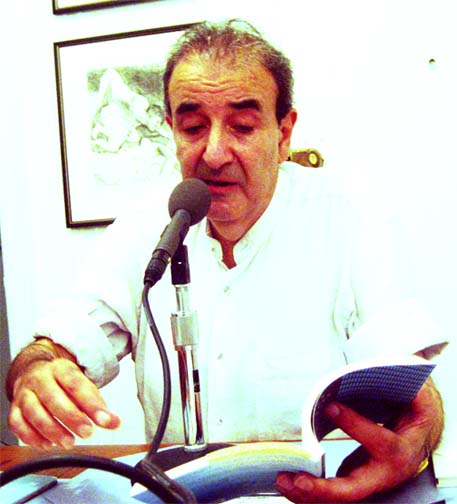 The latest installment of Charles Bernstein's Close Listening series (a co-production of PennSound and Art Radio WPS1.org) has just been posted — a two-part program features poet, critic and legal scholar Lawrence Joseph. During the first program, Joseph reads a wide array of poems from throughout his career, including work from Into It and Codes, Precepts, Biases, and Taboos: Poems 1973-1993 (Farrar, Straus & Giroux, both 2005), along with Curriculum Vitae (University of Pittsburgh, 1988) and Before Our Eyes (Farrar, Straus & Giroux, 1993).
The second segment begins with a discussion of poetic identity, as a product of both biography and geography, and the various personal and textual metamorphoses one undergoes — what Joseph calls "the inner/outer type of problem," as seen in, for example, the work of Wallace Stevens, i.e. "interior languages and exterior languages" conveying both thoughts and feelings. Bernstein develops this further by raising the issue of "story and sound" (Joseph admits he sees great importance in a Steinian narration, along with "the pleasure of sound"), as well as drama and urgancy in the poet's work. From there, the two move on to the differences between poetic and prose expression, focusing on the potential for vocality and intensity in each genre. In the second half of the conversation, Joseph addresses several specific poems read during the first program, starting with a brief discussion of his methodologies for assembling "sets" (a kin to a musician's performance) to fit a given timespan, before moving on to address the ways in which living in a time of tremendous violence has shaped his work, as well as what Bernstein terms the social role of the poet.
On Joseph's PennSound author page, you'll also find a February 2006 reading from the Kelly Writers House (which also offers a broad survey of his work), along with several recordings from Cat Radio Café also featuring D. Nurske and Hugh Seidman. Click on the title above to listen.
Posted 7/9/2008 (link)
 Today, we're highlighting the latest episode of the PoemTalk podcast series — a discussion of Rae Armantrout's poem "The Way" — released earlier this week. For this program, PoemTalk host Al Filreis is joined by an all-star lineup of commentators: Rachel Blau DuPlessis, Charles Bernstein and Ron Silliman.
Silliman begins by noting the appropriateness of the church setting, given Armantrout's explorations of her own religious experience throughout her body of work, and DuPlessis cites a 2006 Close Listening conversation with Bernstein to flesh out some of the poem's opening details. Bernstein then goes on to give a dramatic reading of several lyrics from "Grease is the Way" (from the musical and film Grease, which Armantrout references in the poem), giving way to a number of different interpretations of the poem — from a statement on writing, a cultural and/or religious parody, or a evocative nexus of identity and disorientation. Their spirited discussion also touches on Armantrout's poetic methods, along with the reliability of any given reading of a work, and listeners, relishing the panelists' back-and-forth, will likely feel that this conversation comes to an end all too soon.
We've also just added a newly-segmented Segue Series reading from the Bowery Poetry Club dating from May 26, 2007 — it's one of many recordings you'll find on Armantrout's PennSound author page, including the aforementioned Close Listening reading and conversation from 2006, a 1988 Segue Series reading at the Ear Inn, readings at UPenn from 1998, 2004 and 2007, plus readings from SUNY Buffalo, San Diego. "The Way" is also featured prominently in PennSound Podcast #6 on the pedagogical applications of the PennSound archives.
Posted 7/11/2008 (link)
 Yesterday, we added six new episodes of the acclaimed series LA-Lit from 2007 and 2008. Hosted by Mathew Timmons and Stephanie Rioux, and recorded at Betalevel in Los Angeles, LA-Lit seeks to capture "the shifting nature of Los Angeles as a place," through the voices of "poets, novelists, hybridists, and non-genre text authors" living in or visiting the LA area.
In February, we launched the series with twenty-four episodes, including programs showcasing Lee Ann Brown, Will Alexander, Diane Ward and Sawako Nakayasu, among many others. These new podcasts include featuring Eileen Myles, Nada Gordon and Catherine Daily, plus Demosthenes Agrafiotis, Masha Tupitsyn and Vanessa Place .
LA-Lit is but one of many fantastic series hosted by PennSound which combines readings by some of today's most influential poets with in-depth conversations revealing their inspirations and motivations, their politics and their poetics — in addition to Close Listening and PoemTalk, which launched new episodes this week, you'll also enjoy listening to ongoing series like Cross-Cultural Poetics and Ceptuetics Radio, along with historic broadcasts including LINEbreak, the Radio Readings Project, Susan Howe's Pacifica Radio Programs, In the American Tree, Radio Radio and miPOradio. For even more innovative series, please visit PennSound's Series Page.
Posted 7/14/2008 (link)
 PoemTalk director Steve McLaughlin — who's also the editor of PennSound's Robert Creeley author page — has recently added two new recordings from the late, great poet. The first, a reading at Buffalo's Albright-Knox Art Gallery in 1981 features a wide array of poems from throughout his career, including "I Know a Man," "I is the Grandson," "The Immoral Proposition," "The Conspiracy" and "A Form of Women," along with excerpts from Numbers (1968) and Presences: A Text for Marisol (1976). Appended to the recording is an eleven-minute informal conversation which preceeded the reading.
Our second new addition is "Ballade pour Robert Creeley," originally recorded in 1993 by Jacques Darras as an episode of the French radio documentary program Albatros. In its two forty-minute segments, the poet discusses his life and poetic development, and reads his poetry, alongside Pierre Joris, with improvised musical accompaniment by Steve Lacy's jazz combo.
Of course, these recordings are but a small fragment of what you'll find on PennSound's Robert Creeley author page. Featuring more than forty complete recordings, including germinal readings at Black Mountain College (1954), the Vancouver Poetry Conference (1963) and the Berkeley Poetry Conference (1965), along with numerous lectures, interviews and videos, it's one of PennSound's broadest and most complete pages, serving as a fitting tribute to Creeley's prodigious talents.
Posted 7/15/2008 (link)
 We've recently added four new recordings from Mills College's stellar Contemporary Writers Series, dating from 2006 to this past spring.
The first, recorded January 31, 2006, features Bruce Andrews. He begins with a number of texts which usually accompany performances by dancer Sally Silvers ("Concordance," "Snow Ponies," "Crease") and guitarist Vernon Reid ("Mistaken Identity"); and also includes excerpts from longer works, such as The Millennium Project and Lip Service.
Next is Clayton Eshleman's reading from February 15, 2007, which features his translations of César Vallejo. Eshleman is the preeminent translator of the Peruvian poet, and his generous introductions to the poems illuminate both the historical and cultural contexts for Vallejo's work, as well as the process of translation.
This is followed by Ron Silliman's October 2, 2007 reading, showcasing his classic The Age of Huts including selections from 2197 and The Chinese Notebook.
We conclude with Kenneth Goldsmith's reading from March 11, 2008, which begins with a number of "Letters to Kenny G." sent to him through his WFMU DJ page by correspondents mistaking him for the synonymous lite-jazz saxophonist, and continues with excerpts from his Soliloquy (2001) and his sequel to 2003's Day — a transcription of the September 11, 2001 New York Times — along with a conceptual piece which makes use of transcriptions of tapes of disgraced Senator Larry Craig.
On PennSound's Mills College Contempory Writing Series Page, you'll also find readings from Robert Grenier, Juliana Spahr and Edwin Torres, and we'l be adding more recent readings from the series this summer.
Posted 7/17/2008 (link)
 Today, we've added two new items from Ann Lauterbach — the first, a newly segmented Segue Series Reading from the Bowery Poetry Club dating from March 2006. Drawing heavily from her latest collection, 2005's Hum, Lauterbach reads poems including "XYZ Plus Minus," "Precision Tuning," "Harmony" and "The Book and Dream Club" for an appreciative audience. In the near future, we'll be adding another wonderful Segue Series reading by Lauterbach, this one recorded at the Ear Inn in 1999.
Our second new addition is Lauterbach's essay, "What We Know as We Know It: Reading 'Litany' with J.A.," which originally appeared in Conjunctions #49. An excellent companion to our the breathtaking stereo recording of Ashbery and Lauterbach reading the poem in its entirety which we posted earlier this year. In this essay, Lauterbach offers her perspectives on the multivocal epic, and shares memories of recording and performing it alongside Ashbery over the past three decades. On the PEPC Homepage you'll also find Lauterbach's introduction to Ashbery's 80th Birthday Celebration.
Speaking of Ashbery, stay tuned to PennSound Daily for tomorrow's announcement of several very exciting new recordings of his work from the 1960s and 70s.
Posted 7/18/2008 (link)
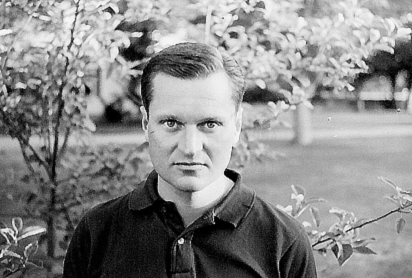 We've recently added a number of new readings from venerable American iconoclast, John Ashbery, including three recordings from the 1970s, and a historic reading from the early 1960s.
We start with Ashbery's September 1963 reading at The Living Theatre, a New York homecoming for the great New York School poet, who'd been abroad in Paris for five years at the time. Kenneth Koch provides a laudatory introduction, in which he claims, "[Ashbery]'s one of the best poets now alive . . . he's writing the best poetry that anyone is writing in the English language," citing both his innovations and his great inspiration on his peers and followers. Ashbery is in top form, reading equally from Some Trees (1955) and The Tennis Court Oath (1962) as well as a number of poems from the manuscript for 1966's Rivers and Mountains, including his much-beloved cento, "To a Waterfowl" and the as-yet unpublished work, "The Adirondacks." It's also worth noting that Ashbery first met the artist Andy Warhol, of whom he'd been a vocal supporter, at this event.
Our next reading comes from a radio broadcast for Poetry's 19th Annual Poetry Day event on Chicago's WFMT in November 1973. Ashbery appeared alongside John Hollander, and read widely from throughout his career, including poems from his first two collections, along with selections from 1970's The Double Dream of Spring and the manuscript of what would become his most-celebrated volume, 1975's Self-Portrait in a Convex Mirror. This reading is complemented nicely by Ashbery's 1975 reading in Buffalo, NY, which samples liberally from the same timeframe with little overlap (save "Variations, Calypso and Fugue on a Theme of Ella Wheeler WIlcox" and "Soonest Mended"), and includes an excerpt from "The New Spirit" from Three Poems (1972).
Finally, we have another radio broadcast — this one a 1977 appearance, alongside Barbara Guest on P.E.N. Portraits, hosted by Ann Fremantle. In this charming half-hour broadcast, both poets discuss their most recent work, and Ashbery reads "What Is Poetry" and "And Ut Pictura Poesis is Her Name," as well as a brief sample of Three Poems. Guest also reads a pair of poems.
We at PennSound are extremely happy to be able to share so broad a survey of the life and work of one of America's greatest living poets with our listening audience. With more than twenty recordings spanning forty-five years and several languages, our John Ashbery author page — which we launched last October — is one of our proudest accomplishments, and we hope to continually add to this resource. The next episode of the PoemTalk podcast series, for example, will focus on a recording of "Crossroads in the Past" recorded as part of Ashbery's visit to UPenn as a Kelly Writers House Fellow in 2002.
Posted 7/24/2008 (link)
 We've recently added a few dozen new Segue Series readings from its birthplace, Soho's fabled Ear Inn, which hosted the series for more than fifteen years, from its 1978 debut (a September 16th reading by John Ashbery and Michael Lally) through to the early 1990s. Today, were focusing solely on those new additions from the final year of the series' first golden era: 1992.
We begin with a February 1st solo reading by the inimitable Jackson Mac Low, which runs nearly an hour long. This nicely complements another Segue Series reading we've recently added, dating from 1978. A week later, the series featured readings by Karin Robbins and Kathleen Fraser. Fans of Fraser's work will also be glad to listen to her 1982 reading at San Francisco's Intersection, another new addition to the site. Finally, we conclude with an October reading showcasing the work of Spencer Selby and Rae Armantrout, who, you'll recall from a recent PennSound Daily, is the subject of the latest PoemTalk podcast (featuring panelists Al Filreis, Charles Bernstein, Rachel Blau DuPlessis and Ron Silliman).
In the coming weeks, we'll continue to highlight these new additions to an already-impressive roster of Segue Series readings at the Ear Inn, and, of course, we'll also be adding even more readings. Keep an eye on the "New at PennSound" sidebar to the right, and PennSound Daily, for all the latest information.
Posted 7/25/2008 (link)
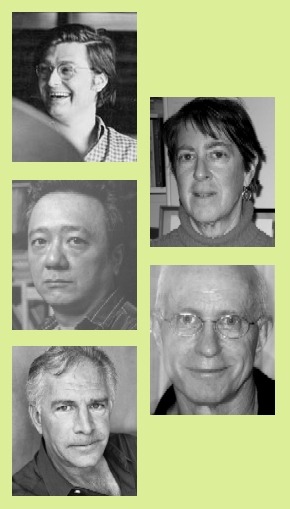 Thanks to Rachel Blau DuPlessis, we're able to share with our listeners this fascinating 1985 recording of readings and a roundtable discussion from Temple University's Tyler School of Art. DuPlessis and host David Hannah are joined by an all-star lineup of poets — Clark Coolidge, Michael Palmer, John Yau and Geoffrey Young — for a conversation on the nexus of visual art and poetics, which touches on, among other topics, the Imagiste and Objectivist roots of contemporary visual verse, sensory experience, the materiality of the printed page and sonic considerations.
This panel discussion was preceeded by individual readings by the poets, all of which are presented here, save Young's, which has been lost. DuPlessis' reading includes a number of poems from her pre-Drafts collection, Wells, along with an early experiment in palimsest marginalia called "Writing." Palmer's set includes the poems "Dearest Poem," "Lies of the Poem," "Six Illustrations" and "View from an Apartment." Coolidge dedicates his poem, "Somehow to be Able to Say" to Palmer, and also reads "Blues for Alice," "A Note on the Mess," "Barely Twombly" and "Ashbery Explains," among others. Finally, Yau begins with one of the title poems from his latest collection, "Corpse and Mirror III," and also reads " Late Night Movies," "Shanghai Shenanigans" and "6 Poems Based on The Fallacies of Enoch by Malcolm Morley" in his short set. To listen to these readings, click on the poets' names above.
Posted 7/29/2008 (link)
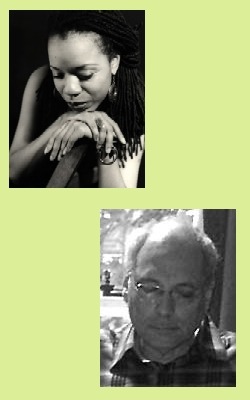 Yesterday, we added several very exciting videos from Tracie Morris' performance at the recent Conceptual Poetry and Its Others", recorded earlier this year at the University of Arizona Poetry Center. In addition to a downloadable MP4 version of the complete thirty-minute reading, we've posted two smaller videos: the coda from "My Great Grand Aunt Meets a Bush Supporter" and another excerpt, "It all started . . ." Click here to watch these videos, and also be sure to check out Morris' main PennSound author page as well.
Morris also appears as part of Charles Bernstein's "What, Me Conceptual?" presentation from the same conference, which begins with the two reading "Truth Be Told," a collaboration which recently appeared in The Brooklyn Rail. Bernstein's presentation, "Recantorium (a bachelor machine, after Duchamp after Kafka)" — a tongue-in-cheek apologia which upholds the virtues of "official verse culture," which "represent[s] the best and the finest, the most profound and significant, the richest and most rewarding, poetry of our nation" — is available in MP4 format, and the accompanying PowerPoint slideshow is also downloadable. Bernstein also provides "a brief primer on bachelor machines," a supplementary list of works in a similar vein, including his 1998 Yellow Pages commercials, 1980's LEGEND (written with Bruce Andrews, Ray DiPalma, Steve McCaffery and Ron Silliman), and 1989's The Nude Formalism (a collaboration with his wife, the artist Susan Bee).
The accompanying reading includes the aforementioned collaboration with Morris, along with a wide array of poems, including two excerpts from "Today's Not Opposite Day" from With Strings (2001), anagrammatica from Shadowtime (2005), "Gertrude & Ludwig's Bogus Adventure" from My Way (1999), along with a discussion of the forthcoming Blind Witness, and the recent poems "Dea%r Fr~ien%d" (from the most recent issue of Conjunctions) and "All the Whiskey in Heaven" (a Valentine's Day paean from The Nation). Click here for Bernstein's Tucson presentation and reading, and also visit Bernstein's PennSound author page for many resources from the last four decades.
Posted 7/31/2008 (link)
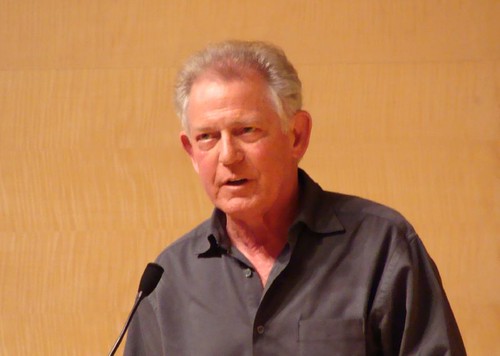 Yesterday, we added two newly segmented readings from the great Bill Berkson — nearly fifty poems in two recordings from the past five years.
Our first recording comes from Berkson's March 15, 2007 reading at the Kelly Writers House. In his introduction, Tom Devaney makes reference to Robert Frost's famous quotation, that "writing free verse is like playing tennis without the net," noting that "in Berkson, we realize that it's much more difficult to play tennis without a net. [...] His poems do not say 'hey, look at me' or 'look what I know';' instead they say 'look.'" The reading includes titles such as "Salad Spinner," "Baby's Awake Now," "By Halves," "Duchamp Dream" and "Our Friends Will Pass Among You Silently," as well as a lengthy excerpt from What's Your Idea of a Good Time?: Letters & Interviews 1977-1985 Berkson's epistolary collaboration with Bernadette Mayer, published in 2006.
Berkson's October 19, 2002 Segue Series Reading at the Bowery Poetry Club includes two selections from Hymns of St. Bridget, a collaboration with Frank O'Hara, as well "Signature Song," "The Shadow on the Page," "An Unmentionable Painting," "A Head at the Covers" and "The Obvious Tradition." On Berkson's PennSound author page, you'll also find interviews on In the American Tree and Cross-Cultural Poetics, separated by nearly three decades. Click on the title above to start listening.
|
PennSound Daily archive
2025
2024
2023
2022
2021
2020
2019
2018
2017
2016
2015
2014
2013
2012
2011
2010
2009
2008
2007
|












